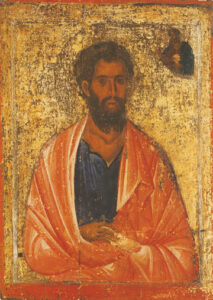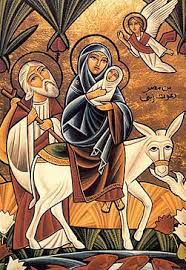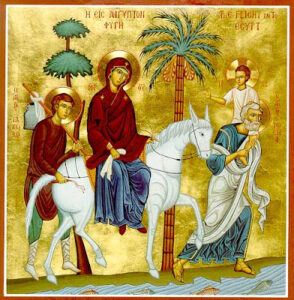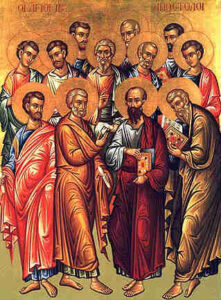
That’s the catchy title some of the Fathers used for Saint James the Just, Brother of Our Lord Jesus Christ, and First Bishop of Jerusalem.
I think they were trying to startle unbelievers, making the point that Jesus of Nazareth is truly God Incarnate, hoping that people might say “What?!” and then perhaps look further into the Christian Faith. For the same reason they sometimes referred to “David, the Ancestor of God” and “Joachim and Anna, the Grandparents of God”, and of course “Mary, the Mother of God”.
I’m wandering. Let’s get to today’s story.
“James, the Brother of Jesus” is an especially problemetic title, because Christian Tradition from the beginning has held that the Virgin Mary and Joseph did not have sexual relations, that she had only one Child, our Lord Jesus Christ. At the end of every Orthodox Litany we hear: “Remembering our most holy, pure, blessed, and glorious Lady, the Theotokos and ever-virgin Mary.”
However, the New Testament tells us that Jesus had other siblings. When He went home to Nazareth and claimed to be Messiah, people said: “Is not this the carpenter’s son? * Is not His mother called Mary? And His brothers James, Joses, Simon, and Judas? And His sisters, are they not all with us?” Matthew 13:55-56
- People did not yet know about the Virgin Birth. Can you figure out why?
Likewise, during His ministry, the Gospels tell about the time Jesus was teaching and someone told Him, “Look, Your mother and Your brothers are standing outside, seeking to speak with You.” Matthew 12:47
How to explain this seeming contradiction? I suspect you know the answer, but just in case:

A book called The Protoevangelium of James *, attributed to James the Brother of the Lord himself, explains that Joseph was an old man, a widower, that James and the others were children of Joseph by his first marriage. That would make James half brother to Jesus.
- The Protoevangelium is not part of the New Testament. However certain things found only within it are accepted in Orthodoxy and even in other branches of Christianity: For example, the names of the Virgin Mary’s parents, Joachim and Anne, and the stories of her Nativity and Presentation in the Temple, as well as the understanding that Joseph was an old widower.
Below is “The Cherry Tree Carol”, a lovely old English song which reflects the once generally accepted tradition that “Joseph was an old man, an old man was he…” The rest of the carol is a bit imaginative, shall we say! grounded, some say, in an apocryphal story about Mary and Joseph involving dates, not cherries.
To hear it, go to “Watch on YouTube”. Then please come back to this Post. You wouldn’t want to miss the rest of the story, would you? Press the reverse arrow at the very top left of my MacBook screen – I don’t know about yours.
So … don’t you go sending out Christmas cards showing Joseph as a handsome young guy. Joseph was an old man, an old man was he.
We can imagine that Joseph’s family at first were extremely skeptical about Mary and her Son – and why wouldn’t they be? Put yourself in their place:
“Here Dad gets engaged to this young girl a third his age, younger than us. than us, who gets herself pregnant by God-knows-who. What a little tramp she is! Now she claims it was by an angel – that the kid is the Son of God! And even worse, Dad falls for this nonsense! This girl has him wrapped around her little finger. He must be getting senile.”
I’m not trying to be irreverent. I’m only saying what had to have been the family’s first reaction.
 What changed their minds? We don’t know.
What changed their minds? We don’t know.
There’s a story that James accompanied the Holy Family in their flight into Egypt – shown in a good many Orthodox icons. I’d guess it was because he couldn’t bear his old father tackling the trek alone. The story says James came home a believer. Note: the young man in back also has a halo about his head. From Egypt come many stories about miracles that took place during the years of their sojourn in Egypt. Here are two accounts from the Coptic (Egyptian) Orthodox Church:
1) http://www.madisoncopticchurch.com/holy-family-in-egypt/
2)
We hear nothing of Saint James during the Lord’s earthly ministry, but we know the risen Lord appeared “privately” to only two men: Simon Peter and James. Luke 24:34, I Corinthians 15:7 Why those two? Apparently because Peter would remain chief of the Apostles, and James was to become first Bishop (episcopos, ἐπίσκοπος, “overseer”) of the Mother Church in Jerusalem.
James, Bishop of Jerusalem
Before long, persecution of Christians began in the Holy City. The first Deacon Stephen and James the brother of John were martyred. Many Christians fled to Antioch or to Cyprus. However, James the Brother of the Lord kept to his post as Bishop, overseeing the Church in Jerusalem.
There is two-fold evidence for that:
1 Saint Paul wrote that, after his conversion but before he began his missionary work, he went up to Jerusalem, apparently to make sure his teaching agreed with the chief Apostles, that they were all on the “same page”. He says he visited “Cephas [Peter] and remained with him fifteen days. But I saw none of the other Apostles except James the Lord’s brother”. Galatians 1:15-17 Peter Chief of the Apostles and James, Bishop of Jerusalem.
 2 The passage about James in Acts 15 is even clearer. It’s the story of the first Church council, the Apostolic Council of Jerusalem. There was division over whether Gentiles, in order to be Christians, first needed to become Jews: keep the Old Testament Law, be circumcised, eat kosher food, keep the Sabbath restrictions and so on. Some said yes, others said no. Peter and Paul in Antioch had been baptizing believing Gentiles and accepting them “as they were”, so to speak. So a Council was held in Jerusalem to decide the matter. Peter’s and Paul’s side won, as you know. (We can eat pork!) That decision allowed the Church to become multi-ethnic, a Faith for all peoples, not remain just a kind of sect of Judaism.
2 The passage about James in Acts 15 is even clearer. It’s the story of the first Church council, the Apostolic Council of Jerusalem. There was division over whether Gentiles, in order to be Christians, first needed to become Jews: keep the Old Testament Law, be circumcised, eat kosher food, keep the Sabbath restrictions and so on. Some said yes, others said no. Peter and Paul in Antioch had been baptizing believing Gentiles and accepting them “as they were”, so to speak. So a Council was held in Jerusalem to decide the matter. Peter’s and Paul’s side won, as you know. (We can eat pork!) That decision allowed the Church to become multi-ethnic, a Faith for all peoples, not remain just a kind of sect of Judaism.
But here’s the chief point: After all had been discussed, it was James who announced the decision: “Men and brethren, listen to me… I judge that we should not trouble those among the Gentiles who are turning to God…”
Peter, chief of the Apostles (first Pope as some say) was there. So wouldn’t you have thought he would have presided? He did not. How Roman Catholics deal with this passage, I do not know. It is not in accord with their understanding of Peter as sole vicar of Christ, from the beginning. However, Orthodox Church polity still reflects Acts 15. In principle all our bishops are equal, and (when things are working right) in each diocese or archdiocese the local bishop or archbishop presides and is in charge.
The Epistle of James
 This is found in the New Testament right between Hebrews and First Peter. When he wrote it is not known. He obviously was dealing with certain problems that had arisen in the Mother Church. There are many notable quotable passages in it. Here are some of them:
This is found in the New Testament right between Hebrews and First Peter. When he wrote it is not known. He obviously was dealing with certain problems that had arisen in the Mother Church. There are many notable quotable passages in it. Here are some of them:
“Do not be deceived, my beloved brethren. ‘Every good gift and every perfect gift is from above and comes down from the Father of lights, with whom there is no variation or shadow of turning.'” (That is quoted in one of the final prayers of the Divine Liturgy.)
“So, my beloved brethren, let every one be swift to hear, slow to speak, slow to wrath, for the wrath of man does not produce the righteousness of God… If anyone… thinks he is religious and does not bridle his tongue but deceives his own heart, his religion is useless. Pure and undefiled religion before God and the Father is this: to visit orphans and widows in their trouble, and to keep oneself unspotted from the world.”
“If there should come into your assembly a man with gold rings, in fine apparel, and there should also come in a poor man in filthy clothes, and you pay attention to the one wearing the fine clothes and say to him ‘You sit here in a good place’ and say to the poor man ‘you stand there’ or ‘sit here at my feet’, have you not shown partiality among yourselves and become judges with evil thoughts? Listen, my brethren, has God not chosen the poor of the world to be rich in faith and heirs of the kingdom of Heaven?”
“Come now, you who are rich. Weep and howl for your miseries that are coming upon you. Your riches are corrupted and your garments are moth-eaten. Your gold and silver are corroded… You have heaped up treasure in the last days… the wages of the laborers who mowed your fields, which you kept back by fraud, cry out… You have lived on the earth in pleasure and luxury, you have fattened your hearts for a day of slaughter.”
There were some at the time (as there are yet today) who misinterpreted the writings of Saint Paul to mean that all we need to be saved is have faith, that good works [how we live] are not necessary for salvation. So James wrote to clarify the matter: “What does it profit, my brethren, if someone says he has faith but does not have works? Can faith save him? If a brother or sister is naked and destitute of daily food and one of you says to them ‘Depart in peace, be warmed and filled’, but you do not give them the things which are needed for the body, what does it profit? Thus also faith by itself, if it does not have works, is dead. But someone will say ‘You have faith and I have works’. Show me your faith without your works, and I will show you my faith by my works.”
Martin Luther believed that we are saved by “faith alone”. The preceding passage so distressed him that he called the letter of James an “epistle of straw” and said he wished he could remove it from the Bible! (How that fit with Luther’s principle of “Sola Scriptura / Scriptures alone” – that I can’t explain.)
“Where do wars and fights come from among you? Do they not come from your desires for pleasure that are at war within you? You lust and do not have. You murder and covet and cannot obtain. You fight and make war. You do not have because you do not ask. You ask and do not receive because you ask amiss, that you may spend it on your pleasures… do you not know that friendship with the world is enmity with God?”
Finally a passage that is read at the Orthodox Holy Unction service: “Is any one among you suffering? Let him pray. Is anyone cheerful? Let him sing psalms. Is anyone among you sick? Let him call for the presbyters of the Church and let them pray over him, anointing him with oil in the name of the Lord. And the prayer of faith will save the sick, and the Lord will raise him up, and if he has commited sins he will be forgiven.”
There’s much more. You should read the entire Epistle of Saint James.
The Divine Liturgy of Saint James
To James also is attributed the Divine Liturgy of the Church in Jerusalem: the Liturgy of Saint James. Like all our Liturgies it grew and developed during the early centuries, but among the Oriental Orthodox there are several forms of it – unlike our Byzantine Liturgies of Saint Chrysostom and Saint Basil which have had fixed forms for many centuries. In our Byzantine practice the Liturgy of Saint James is sometimes celebrated on October 23, especially in churches dedicated to Saint James. It is celebrated much more frequently among the Oriental Orthodox.
Some scholars say James had no connection with The Liturgy of Saint James. I’m no liturgical scholar, but I wonder if that is akin to the belief that the Gospels were not written by Matthew, Mark, Luke and John, or that Shakespeare did not write the Shakespearean plays. If it had no connection whatever with Saint James, wouldn’t it have been called The Liturgy of Jerusalem or something like that?
In any of its forms the Liturgy of Saint James is l o n g. It is said that our Divine Liturgy of Saint Basil is (believe it or not) an abbreviated form of the Liturgy of Saint James, condensed by Archbishop Basil because he thought standing for four hours was too much for his people to handle. And now we usually shorten Basil’s Liturgy, with most of the Anaphora said silently by the priest. (What a bunch of weaklngs we are.)
If you have the time, here is a version of the Liturgy of Saint James which lasts only 3 1/4 hours.
The Liturgy of Saint James preserves some elements which we Byzantines have lost. Among them:
1 An Old Testament reading. If there is any one thing I wish we had in our Liturgies, this is it. Most of our people have lost touch with our Old Testament foundations.
2 The people (not only the clergy) exchange the kiss of peace – the liturgical sign that “if you bring your gift to the altar, and there remember that your brother has something against you, leave your gift there before the altar, and go your way. First be reconciled to your brother, and then come and offer your gift.” Matthew 5:23-24 (Our dear Antiochian Metropolitan Philip, of thrice-blessed memory, urged all his churches to recover this practice. A few of us actually did.)
To find a version of the text of the Liturgy of Saint James, as authorized by the Greek Orthodox Archdiocese of Australia, search “Divine Liturgy of Saint James – Evangelismos Church”.
The Martyrdom of Saint James
The early Christians in Jerusalem were outsiders, despised, sometimes persecuted. Tradition says, however, that Bishop James was respected by many, popularly called James the Just. That did not give him any security. One day the Jewish chief priests took him to a tower of the Temple and advised him that, as a just man, he should now tell the crowd below that his stepbrother was not really the Messiah. Instead James proclaimed the Gospel of his Brother Jesus Christ, the Son of God!

So they pushed him off the edge. He survived the fall but someone in the crowd took a club to his head, and he died, a martyr.
But the Gospel of His Brother Jesus Christ did not die, and James rejoices now with and all His Family – our Family – in Heaven.
Next Week: From Ghoulies and Ghosties and Long-leggety Beasties and things that go bump in the night: Good Lord, deliver us.
Week after Next: Saint Nektarios returns!
Dear Father,
There is something wrong with the numeration of this post (it should be # 353 I believe). Probably this is the reason why it does not appear on the front page.
Greetings,
Valery
I do believe you’re right.
And me, a math minor in college. Nevertheless I’ve always found “higher mathematics” (apparently beginning with 352…) difficult to understand.
I’ve made the appropriate correction.
Valery, thanks for your attentiveness.
Father Bill